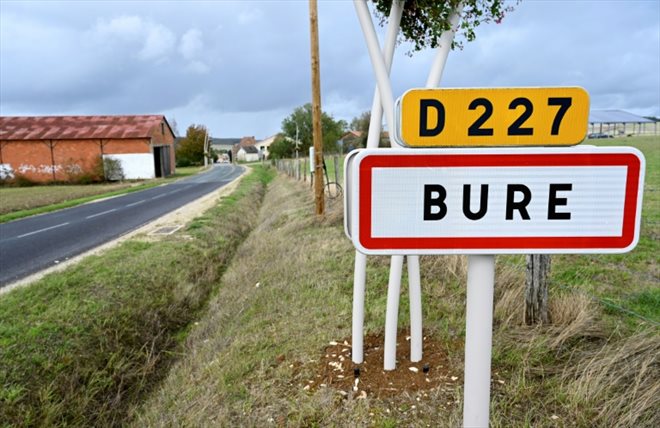A banner against the nuclear waste landfill project in Bure (Meuse), August 6, 2022 (AFP/Archives/Jean-Christophe Verhaegen)
The Constitutional Council rules on Friday on the rights of future generations invoked by opponents of the Cigéo center project for the burial of the most radioactive waste in Bure (Meuse) from nuclear power plants, in a decision which must be a landmark for the protection of the environment.
Validated by the government which declared it of public utility in 2022, the Cigéo geological storage project 500 meters underground has already completed numerous stages, although contested for more than twenty years.
Latest appeal to date: the declaration of public utility was attacked before the Council of State by local residents, 14 local and 7 national organizations such as Attac, France Nature Environnement, Greenpeace or even “Sortir du nuclear”.
This appeal was an opportunity to pose a Priority Question of Constitutionality (QPC) to the Constitutional Council to verify whether the method of waste treatment planned in the clayey subsoil of Bure respects the constitutional principles, namely those set out in the preamble. of the 2005 Environmental Charter.
Anti-nuclear activists, local residents and environmental defenders are waiting for the Wise Men to set “the content of the protection that our supreme standard grants to future generations”, according to their press release.
– “Subtle balance” –
The question is crucial: “This may have consequences on the authorization of new projects which will be evaluated according to their immediate and future consequences,” says lawyer specializing in environmental law Vincent Brenot, associated with the August Debouzy firm. , which usually defends industrialists, but is not a party to this case.

An underground storage “cell” for nuclear waste on the Cigéo site in Bure (Meuse), November 21, 2017 (AFP/Archives/FREDERICK FLORIN)
“There is a subtle balance to be found on the part of the Constitutional Council,” he said, “because we are both in a period where we are very attentive to the environment and in the midst of a quest for renewal. of our industrial sovereignty.
In terms of landfilling waste, the principle imposed by French texts is to ensure the reversibility of the storage method, for at least several decades during which it is necessary to be able to change method or recover the waste.
However, the applicants argue, the considerable period – up to hundreds of thousands of years – during which the most toxic waste must be preserved before radiation falls to safe levels far exceeds this duration, and undermines the right future generations.
– Solidarity and fraternity –
As future generations do not exist, the reasoning is based on our obligations of solidarity and fraternity towards them. The Constitutional Council must say to what extent.
France has three surface storage centers, two in Aube and one in Manche, which make it possible to store 90% of the radioactive waste produced in the territory.

The entrance to the village of Bure (Meuse), October 7, 2020 (AFP/Archives/JEAN-CHRISTOPHE VERHAEGEN)
The most radioactive nuclear waste, those with high intensity and long life, could be stored by 2035-2040 in the clayey subsoil of Bure, on the borders of the Meuse and Haute-Marne. The site could accommodate at least 83,000 m3, like the Finnish Onkalo depot, designed to house the spent fuel released throughout their lifespan by the five national reactors.
Like every nuclear site, Cigéo will be subject to a double technical examination by the Nuclear Safety Authority (ASN) and the IRSN, the Institute which monitors nuclear risk, which will take around three years.
For the moment, the Andra Meuse site only hosts a scientific laboratory; no radioactive waste is stored there.
The project has sparked numerous episodes of protest.
On September 2, a demonstration took place again under close surveillance and brought together several hundred people, local residents but also anti-nuclear activists of different nationalities (French, Germans, Swiss, Brazilians, Colombians) who came to denounce the “forceful passage” of the state.
© 2023 AFP
Did you like this article ? Share it with your friends using the buttons below.




